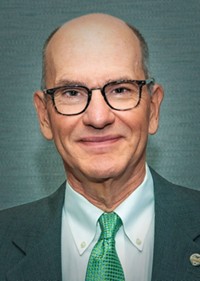Advertisement
Grab your lab coat. Let's get started
Welcome!
Welcome!
Create an account below to get 6 C&EN articles per month, receive newsletters and more - all free.
It seems this is your first time logging in online. Please enter the following information to continue.
As an ACS member you automatically get access to this site. All we need is few more details to create your reading experience.
Not you? Sign in with a different account.
Not you? Sign in with a different account.
ERROR 1
ERROR 1
ERROR 2
ERROR 2
ERROR 2
ERROR 2
ERROR 2
Password and Confirm password must match.
If you have an ACS member number, please enter it here so we can link this account to your membership. (optional)
ERROR 2
ACS values your privacy. By submitting your information, you are gaining access to C&EN and subscribing to our weekly newsletter. We use the information you provide to make your reading experience better, and we will never sell your data to third party members.
Comment
Why we should care about patents
by Kirby Drake, Chair, ACS Committee on Patents and Related Matters
September 28, 2019
| A version of this story appeared in
Volume 97, Issue 38

“I’m not an inventor or an attorney. Why should I care about patents?” This is a question I am asked quite frequently when people learn that I am a patent attorney. (The other top question is whether I watch the TV show Shark Tank. The answer is, “Yes, I do, and I have even represented some companies that have appeared on Shark Tank,” which almost always draws some interest.) But on the question of why someone should care about patents, my answer is generally the same. All of us will encounter patents in one way or another throughout our careers and our lives. Patents can guide and affect many aspects of your life, regardless of where you are in your career or what you do. Here are just a few examples:
▸ If you are a researcher or a student, patents can be one of the broadest (and most publicly available) sources of technical information. The European Patent Office estimates that up to 30% of all expenditure in research and development is wasted on redeveloping existing inventions. Being aware of patents can help you avoid reinventing the wheel.
▸ If you are in industry, patents can aid you in gathering business intelligence. Patents provide information on the state of the art in a technology area. This information can enable you to monitor how competitors may be innovating in your technology area or aid in determining what improvements may be made to the technology.
▸ Outside of where you work or what you do, almost all of us at some point in our lives will need prescription drugs. Prescription drug prices can sometimes be affected by the existence of patents, and patents can affect when generic drugs can hit the market. If these are issues that affect you, understanding the interplay between patents and pharmaceuticals may be helpful in advocacy efforts or even just for confirming when generic drugs may be available.
▸ Overall in the chemistry community, innovation is a key indicator of economic progress, and patent protection can help ensure that inventors and innovators continue to have fair and appropriate incentives to innovate.
▸ Whether you are a student, a professor, an industry employee, someone in a nontraditional chemistry career, or even a retiree, the Committee on Patents and Related Matters (CPRM) can help you answer the question of why we in the chemistry community should care about patents. Here are just a few ways that the committee works to answer the question:
CPRM educates American Chemical Society members and the public on intellectual property. This includes the development and promotion of educational resources on topics including patents, trade secrets, copyrights, and technology transfer. These resources are available through the CPRM website. CPRM also collaborates with the US Patent and Trademark Office (USPTO). We have secured volunteer chemical scientists and engineers, from both industry and academia, to participate in the USPTO’s Patent Examiner Technical Training Program. Through this effort, we help educate patent examiners, enabling them to keep pace with recent developments in chemistry. We encourage ACS members to volunteer as guest lecturers, and we thank those who have volunteered in the past. Guest lecturers can present in person at the USPTO’s offices in Alexandria, Virginia; Dallas; Denver; Detroit; or Silicon Valley or virtually from home or work, and their lectures will be broadcast to patent examiners nationwide.
CPRM promotes the recognition of chemistry-related inventors’ contributions by recommending that the ACS Board nominate deserving chemical scientists and engineers for external awards, such as the National Inventors Hall of Fame. Recent ACS members receiving this honor include Carolyn Bertozzi, for inventing the field of bioorthogonal chemistry; Marvin Caruthers, for developing the methods for chemically synthesizing DNA; and Sumita Mitra, for inventing the first dental filling material to include nanoparticles. We are excited about the upcoming induction of a preeminent industrial chemist into the National Inventors Hall of Fame. Her identity is still confidential; the official announcement will come this winter. Watch for this announcement in C&EN. CPRM also recommends nominations for the National Women’s Hall of Fame and the National Medal of Technology and Innovation. CPRM welcomes your suggestions and nominations for these important awards.
CPRM also makes advocacy a priority. This year, Congress announced its intention to once again take up the thorny issue of patent reform. CPRM is working closely with the ACS legislative network to follow these issues and advise as appropriate on behalf of ACS, guided by the ACS position statement on intellectual property.
Though it is impossible to adequately describe all the reasons you should care about patents, hopefully this Comment sheds some light on why we at CPRM have made intellectual property—particularly patents—a focus of the work that we do on behalf of ACS. CPRM welcomes any input, including volunteers for the Patent Examiner Technical Training Program and nominations for the national awards. You can reach us at patents@acs.org.
Views expressed are those of the author and not necessarily those of C&EN or ACS.





Join the conversation
Contact the reporter
Submit a Letter to the Editor for publication
Engage with us on Twitter